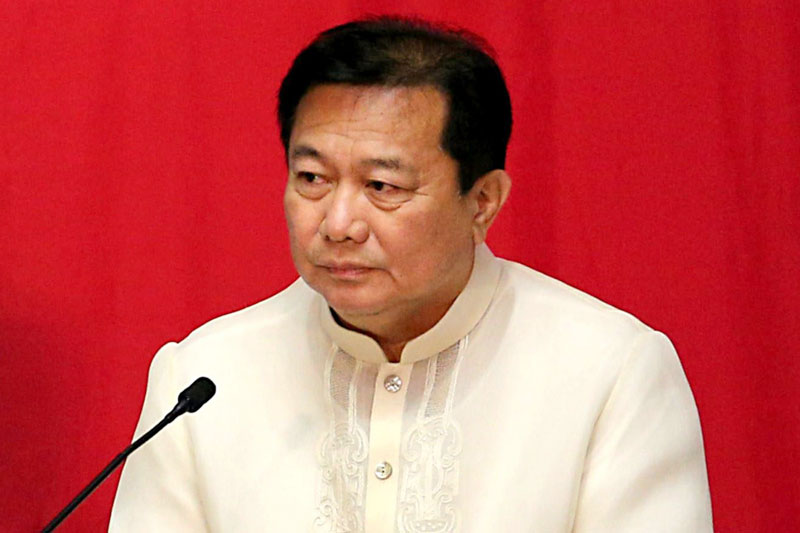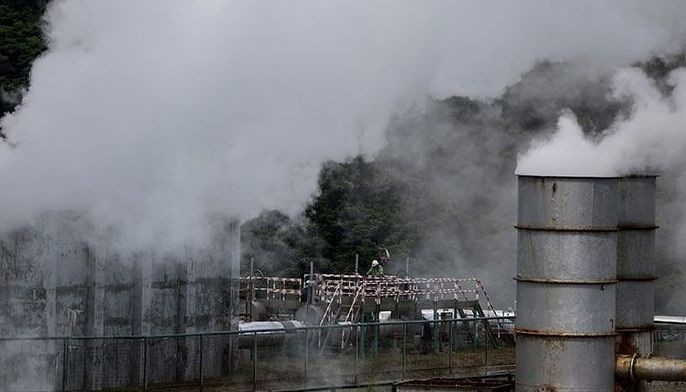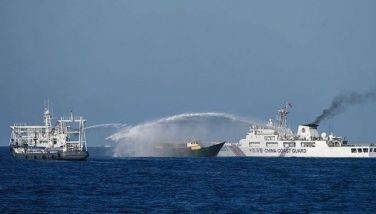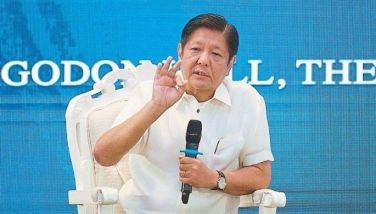Asean to China: Stop raising tension at sea
NAYPYIDAW – Taking off from the joint statement of the foreign ministers, leaders of the Association of Southeast Asian Nations (ASEAN) declared yesterday that all parties to the South China Sea dispute must stop raising tensions in the area, amid China’s more aggressive actions to assert its claim.
The Naypyidaw Declaration on Realization of the ASEAN Community by 2015 said ASEAN leaders agreed to “strengthen cooperation†for the implementation of the Declaration on the Conduct of Parties in the South China Sea (DOC) in accordance with universally recognized principles of international law, including the 1982 United Nations Convention on the Law of the Sea (UNCLOS), “especially calling on parties to exercise self-restraint and non-use of force.â€
The leaders also said parties must “refrain from taking actions that would escalate tension and to work toward an early conclusion of the Code of Conduct in the South China Sea as reflected in the ASEAN’s Six-Point Principles on the South China Sea.â€
They also agreed to promote and uphold the rule of law in the conduct of relations, including the peaceful resolution of disputes.
This has been the pitch of President Aquino as the Philippines went to the arbitral tribunal to peacefully settle the country’s maritime dispute with China.
Gunboat diplomacy
Some leaders spoke boldly about the need for ASEAN to unite and ensure that it would not become an insignificant force in the face of challenges.
In a press briefing at the Myanmar International Convention Center here, Presidential Communications Operations Office Secretary Herminio Coloma Jr. said Indonesian President Susilo Bambang Yudhoyono manifested that “there should be no room for the use of gunboat diplomacy†because what should be promoted is “peaceful means of settling disputes†by following the UNCLOS and the DOC.
In international politics, gunboat diplomacy or “big stick diplomacy†in US history means having conspicuous displays of naval power to help the pursuit of foreign policy objectives, implying or constituting a direct threat of warfare, if the terms of negotiations will not be agreeable to the superior force.
In his extemporaneous remarks following his prepared statement, Yudhoyono, who was congratulated by many of his fellow heads of states as he was completing his second two-year term of office as Indonesian president, emphasized the need for ASEAN solidarity, Coloma said.
“He called on the members of ASEAN to show moral courage and he spoke after the president of Vietnam also called on ASEAN solidarity for following the rule of law,†Coloma said.
Coloma said Malaysian President Najib Razak also called for “concrete demonstration of ASEAN solidarity in terms of promoting adherence to the rule of law†and display moral strength even in the face of “daunting situations.â€
“He said that this is the way by which ASEAN could project itself as a respectable and reliable organization,†Coloma added.
“We will notice that Malaysia, like the Philippines, is also involved in disputes over maritime domain in the South China Sea. We are aware that Vietnam is contesting certain actions taken against it in the South China Sea,†he said.
Coloma said Vietnamese President Truong Tan Sang called for an end to the “brazen attacks†in the South China Sea and urged ASEAN to continue to work for unity and solidarity.
In the plenary session of the leaders, Coloma said several heads of state expressed support for following the rule of law and peaceful settlement of disputes, which had been the key concepts promoted by the Philippines in past meetings of ASEAN.
“We will recall that in the middle of 2012, the Foreign Minister’s Meeting failed to come up with a communiqué. But in December 2012, on the prodding of President Aquino, there was agreement that ASEAN should start fleshing out the declaration on the conduct of parties involved in the South China Sea disputes. And from then on, there has been significant progress in terms of attaining support for the positions taken by the government,†Coloma said.
Big step
Foreign Affairs Secretary Albert del Rosario said the foreign ministers’ statement on Saturday, even without directly mentioning China, was a significant step forward in the context of the dynamics of ASEAN.
When a similar foreign ministers meeting was held in Cambodia two years ago, they failed to come up with a joint communiqué because of an impassé over whether or not to mention the South China Sea conflict.
Coloma said it was the Vietnamese that raised the recent developments in the South China Sea, which rolled over and led to the issuance of the foreign ministers’ joint statement.
Foreign ministers expressed serious concerns and called for restraint amid China’s incursions in the South China Sea, as the grouping faced criticisms that it could not stand up for its members getting bullied by Beijing.
No more moratorium
President Aquino, for his part, pushed vigorously yesterday for the ASEAN member-countries’ full integration rather than promote the status quo amid challenges in the South China Sea, poverty in the region, disasters and climate change that could reverse economic gains.
“We call for a review of the current policy of moratorium,†Aquino said, adding they should devise ways and means for ASEAN to expand development and dialogue cooperation with other interested states, regions and multilateral organizations that were in “a position to contribute to our community-building efforts.â€
The President also called anew for adherence to the rule of law without directly mentioning the territorial dispute with China.
“We stand firm in our belief – a belief shared by all – that the rule of law is key in fostering a climate of stability, one that allows our societies and our people to flourish. As such, we look forward to working with our colleagues and partners in this summit toward enhancing our engagements in promoting the rule of law,†Aquino said in his intervention during the ASEAN Summit Plenary held at the Ruby Hall of the Myanmar International Convention Center here on external relations and future directions of ASEAN as a group.
“It is only natural that ASEAN seeks to engage more of the world in its pursuit of inclusive growth and integration. Perhaps the time has come to study ways on how best to do this efficiently – for instance, in engaging with others as regional blocs, instead of as individual nations,†Aquino said.
The President expressed belief ASEAN member-countries shared the advocacy of an outward-looking grouping with a more “inclusive perspective†in relating with dialogue partners, as well as those wishing to engage with ASEAN more comprehensively and openly.
He said without doubt, ASEAN had achieved much in the past 46 years, but “much more remains to be done.â€
As leaders who envision the sustained progress, peace and stability of their respective nations and of ASEAN, Aquino said they would now have to deal with the challenge of exploring all avenues that could help them realize their vision.
“An ASEAN that envisions itself to be people-centered and people-oriented must be bold in harnessing innovation and existing ties to fully develop a regional organization that is composed of a more empowered citizenry,†Aquino said.
Meanwhile, Aquino also said he was looking forward to prospects for greater economic development once ASEAN integration had taken place, which would include greater facilitation of goods, services and persons.
- Latest
- Trending



























